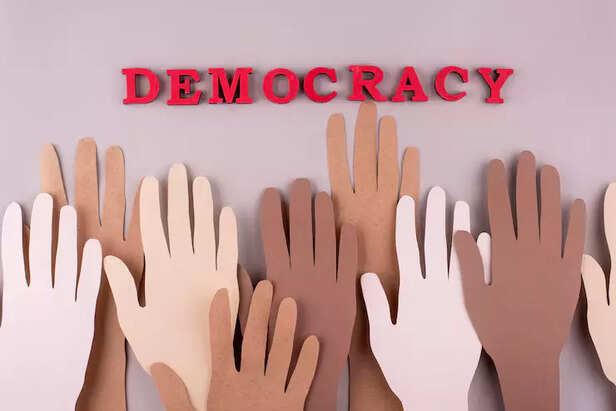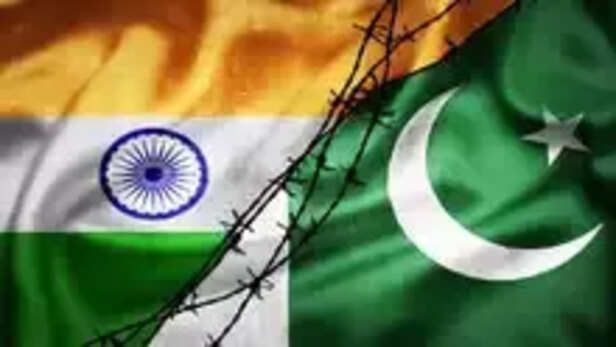The Hidden Forces Undermining Pakistan’s Growth
Amritansh Nayak | May 10, 2025, 09:45 IST

Pakistan's progress is being hampered by systemic corruption, growing extremism, and popular indifference. These interconnected crises have threatened social and economic stability, damaged institutions, and reduced public trust. The country runs the risk of losing its future to forces that profit from dysfunction and disappointment if immediate reforms and civic awakening are not implemented.
Pakistan is at a turning point in its history, dealing with a hazardous and complicated combination of escalating extremism, governmental corruption, and civic apathy. These factors have seriously damaged the nation's economy, social cohesiveness, and government. Public resources have been depleted by corruption, violence and fear have been stoked by extremism, and both have been allowed to grow unchecked due to public disengagement. A vicious cycle of dysfunction and hopelessness is created when one problem feeds into another. This essay examines the causes and effects of these issues and presents a plan for reclaiming the promise of the country via education, reform, and engaged citizenship.

Pakistan's development and governance have been severely hampered by systemic political corruption. It has damaged important areas including infrastructure, healthcare, and education over decades, depleted national resources, and damaged public trust. Corruption is not just confined to a small number of bad actors; it is ingrained in organizations where power abuse, nepotism, and bribery are frequently accepted and seldom dealt with. Serious mismanagement of public monies has resulted from this unfettered corruption. Because of corruption and partiality, projects aimed at enhancing roads, schools, and hospitals are either shelved or inadequately carried out. Millions of Pakistanis are consequently deprived of access to essential services.
Students suffer in schools that are overcrowded and underfunded. Long wait times and subpar care are problems for citizens in the healthcare system. Particularly in rural areas, infrastructure development is substantially behind schedule. Additionally, corruption discourages local entrepreneurship and discourages foreign investment, which slows economic growth and job creation. Most harmful of all, it fosters cynicism and general indifference. People lose faith in the system when they witness impunity for the corrupt and justice only for the powerful. To put it briefly, political corruption is a national catastrophe that jeopardizes Pakistan's future by undermining the very institutions that are supposed to assist its citizens. It is not merely a problem with governance.

One of the biggest risks to Pakistan's social and economic stability today is religious and ideological extremism. Extremist organizations have grown in power over the last few decades by taking advantage of political unrest, poverty, and educational disparities. What started out as fringe beliefs have now influenced popular narratives, upsetting social harmony and encouraging violence. Targeting religious minorities, progressive voices, and even other Muslims who hold different views, extremist ideologies frequently encourage prejudice. Devastating acts of terrorism, sectarian violence, and generalized dread have resulted from these divisions. Attacks have increased the vulnerability of public areas like marketplaces, schools, and houses of worship, resulting in an atmosphere of insecurity that permeates daily life.
There are significant economic repercussions from this volatility. When a country is seen as unsafe, foreign tourists and investors are hesitant to visit, which results in lost money and slowed progress. Additionally, local businesses are threatened with extortion or destruction, especially in areas where violent groups are allowed to operate without consequence. In addition to the damage to Pakistan's economy and security, extremism erodes the foundation of a pluralistic, diverse society and harms Pakistan's reputation abroad. The nation's future will be further stolen by intolerance if strong action is not taken and radical ideologies are not rejected by society.

In Pakistan, a growing culture of indifference has turned into a covert facilitator of the same things that are destroying the country: corruption, extremism, and poor government. Many individuals have been disillusioned and disengaged from civic life as a result of decades of broken promises, structural injustice, and political instability. Because of this disengagement, there is a void where wrongdoers can act without consequence. A risky change is indicated when individuals cease to vote, demonstrate, or engage in democratic activities: the ceding of public authority. This tacit acceptance enables radical narratives to proliferate unopposed and corrupt officials to behave without worrying about repercussions.
Apathy turns into tacit agreement, undermining the media's and civil society's influence and enabling the state to operate with little to no monitoring. Additionally, radicalization thrives on hopelessness, especially among young people. Many people stop participating constructively because they feel neglected and helpless, or worse, they become victims of extremist propaganda that gives them a false sense of direction. For Pakistan's future, civic consciousness must be revived. Efforts to combat extremism and corruption will fail if the public is not engaged, knowledgeable, and brave. In the face of injustice, remaining silent is collaboration, not neutrality.

Although Pakistan's foundations have been severely harmed by corruption, fanaticism, and indifference, the future is still reversible. A strong, group commitment to reform and civic duty is necessary for real transformation. The first step is to build institutions, which includes holding all officials accountable regardless of their position or party affiliation, guaranteeing transparency in government, and establishing the judiciary's independence. Efforts to combat corruption will only be symbolic if institutional transformation is not implemented. Prioritizing education is also necessary, not only in terms of accessibility but also in terms of substance and quality. People who are well-informed are less prone to accept corruption or believe radical narratives.
Building a more resilient society requires education that fosters civic ideals, tolerance, and critical thinking. It is equally important to empower young people, who comprise the majority of the population. Their energy can be directed towards advancement and away from frustration by offering them chances for work, entrepreneurship, and political engagement. Lastly, it's critical to promote civic duty. Voting, speaking up, and holding leaders accountable are democratic activities that citizens must adopt in order to progress past passive observation. A culture of active citizenship can be shaped by the media, civil society, and educational institutions. Reclaiming Pakistan's future is possible, but it will require bravery, solidarity, and a national awakening motivated by values and purpose.
Although Pakistan faces many obstacles, they are not insurmountable. The nation can overcome corruption, fanaticism, and indifference by embracing institutional reform, empowering young, and restoring civic duty. But with persistent national effort and collective determination, Pakistan may still regain its destiny and create a more equitable, stable, and wealthy country for future generations. The road to recovery requires bravery and solidarity.
Explore the latest trends and tips in Health & Fitness, Travel, Life Hacks, Fashion & Beauty, and Relationships at Times Life!

corruption leading to downfall
The Profound Causes and Effects of Political Corruption
Students suffer in schools that are overcrowded and underfunded. Long wait times and subpar care are problems for citizens in the healthcare system. Particularly in rural areas, infrastructure development is substantially behind schedule. Additionally, corruption discourages local entrepreneurship and discourages foreign investment, which slows economic growth and job creation. Most harmful of all, it fosters cynicism and general indifference. People lose faith in the system when they witness impunity for the corrupt and justice only for the powerful. To put it briefly, political corruption is a national catastrophe that jeopardizes Pakistan's future by undermining the very institutions that are supposed to assist its citizens. It is not merely a problem with governance.

political reform Pakistan,
Extremism's Ascent and Hold on Society
There are significant economic repercussions from this volatility. When a country is seen as unsafe, foreign tourists and investors are hesitant to visit, which results in lost money and slowed progress. Additionally, local businesses are threatened with extortion or destruction, especially in areas where violent groups are allowed to operate without consequence. In addition to the damage to Pakistan's economy and security, extremism erodes the foundation of a pluralistic, diverse society and harms Pakistan's reputation abroad. The nation's future will be further stolen by intolerance if strong action is not taken and radical ideologies are not rejected by society.

civic apathy
Silence and Public Disengagement
Apathy turns into tacit agreement, undermining the media's and civil society's influence and enabling the state to operate with little to no monitoring. Additionally, radicalization thrives on hopelessness, especially among young people. Many people stop participating constructively because they feel neglected and helpless, or worse, they become victims of extremist propaganda that gives them a false sense of direction. For Pakistan's future, civic consciousness must be revived. Efforts to combat extremism and corruption will fail if the public is not engaged, knowledgeable, and brave. In the face of injustice, remaining silent is collaboration, not neutrality.

Pakistan social issues
Regaining the Future via Civic Engagement and Reform
Building a more resilient society requires education that fosters civic ideals, tolerance, and critical thinking. It is equally important to empower young people, who comprise the majority of the population. Their energy can be directed towards advancement and away from frustration by offering them chances for work, entrepreneurship, and political engagement. Lastly, it's critical to promote civic duty. Voting, speaking up, and holding leaders accountable are democratic activities that citizens must adopt in order to progress past passive observation. A culture of active citizenship can be shaped by the media, civil society, and educational institutions. Reclaiming Pakistan's future is possible, but it will require bravery, solidarity, and a national awakening motivated by values and purpose.
Although Pakistan faces many obstacles, they are not insurmountable. The nation can overcome corruption, fanaticism, and indifference by embracing institutional reform, empowering young, and restoring civic duty. But with persistent national effort and collective determination, Pakistan may still regain its destiny and create a more equitable, stable, and wealthy country for future generations. The road to recovery requires bravery and solidarity.
Explore the latest trends and tips in Health & Fitness, Travel, Life Hacks, Fashion & Beauty, and Relationships at Times Life!
